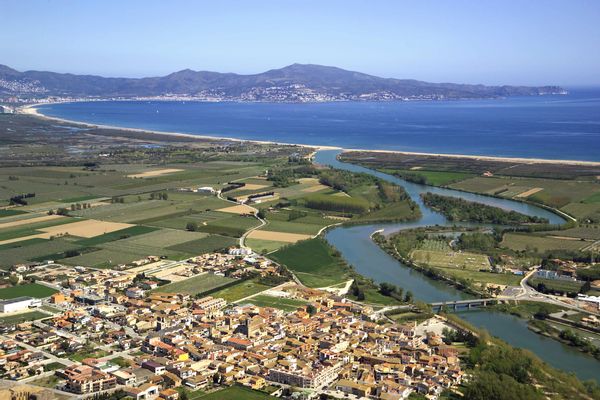This Mediterranean fishing port is known for its anchovies and Greek-Roman ruins at Empúries. Sandy beaches and a 16th-century church overlook the Costa Brava coast.
L'Escala sits along Catalonia's Alt Empordà coast, stretching from the Gulf of Roses to Cala Montgó. Anchovy fishing boats still dock at its port, and you'll see workers preparing salt-cured fillets in waterfront warehouses. Start your visit at Riells Beach, where families swim in shallow waters, or walk through the stone archways of the 17th-century Alfolí de la Sal building. The Greek and Roman ruins at Empúries, founded over 2,600 years ago, let you stand on original mosaic floors from ancient trading posts. Coastal paths wind past pine trees and rocky coves, connecting the town to quieter swimming spots like Portitxol Bay.
Greek and Roman Ruins at Empúries
Walk 20 minutes north from L'Escala's center to reach Empúries, where stone foundations mark one of Spain's oldest Greek settlements. Archaeologists uncovered a marketplace, water cisterns, and statues here, with the earliest artifacts dating to 580 BCE. Climb the steps of the Roman amphitheater to see where spectators once watched plays, then follow the marked trail through residential quarters with preserved mosaic floors. The site museum displays bronze coins, ceramic oil lamps, and marble sculptures found during digs. Don't miss the nearby Sant Martí d'Empúries village, where medieval walls encircle a 10th-century church built atop Roman foundations.
Swimming Areas and Shoreline Trails
Riells Beach has soft sand, gentle waves, and lifeguards on duty from June to September. Rent a paddleboard near the main pier or join locals for morning swims before the afternoon breeze picks up. A paved trail follows the coast south to Cala Montgó, passing tide pools and fishermen's huts along the way. At Montgó, two separate coves divide the beach: the northern side has fewer crowds, while the southern end offers kayak rentals. If you prefer shaded areas, Rec del Molí Beach west of the port has pebbly shores surrounded by tamarisk trees.
Salt-Cured Anchovies and Seafood Restaurants
Watch workers layer anchovies with sea salt in wooden barrels at family-run workshops like Conservas Coll near the marina. Order pan con tomate y anchoas at waterfront eateries—thick slices of bread topped with ripe tomatoes and oily fillets. For hot dishes, try suquet de peix stew at Can Miquel or grilled cuttlefish at Casa Mateu, both located near the old town's stone fountain. Shops along Carrer de l'Església sell vacuum-packed anchovies to take home. During the September anchovy festival, chefs demonstrate filleting techniques and serve free samples on crusty bread.
Scuba Diving and Bike Routes
Dive shops in the port organize daily boat trips to the Illes Medes islands, where groupers and barracudas swim around underwater caves. Beginners can take introductory dives in Portitxol Bay's calm waters, practicing skills over sandy bottoms at 6-meter depths. Rent a bicycle to explore the 14-kilometer Vies Verdes trail, a flat gravel path through the Aiguamolls de l'Empordà wetlands. Look for purple herons nesting in reeds and glossy ibises probing mudflats with curved beaks. More challenging routes lead up the Montgrí Massif, a limestone hill with panoramic views of the Pyrenees on clear days.
Where to Stay and Getting Around
Most accommodations are apartments or vacation homes with kitchens, many clustered within 500 meters of Riells Beach. Hotel Nieves Mar has 32 rooms with balconies facing the sea, plus a rooftop terrace serving breakfast. Summer bookings fill quickly, especially for properties with private gardens or pools. To arrive by public transport, take the SARFA bus from Girona's station—it stops at Plaça de l'Estació, a 10-minute walk from the tourist office. Once in town, rent electric bikes near the port to reach Empúries without parking hassles. Walking takes 25 minutes to the ruins along a shaded pedestrian path.



















